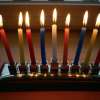I came across a provocative statement about a possible relationship between Judaism and Christianity in Herman Wouk’s important work This is My God. The great writer, in helping his readers grasp the truths and flavors of Judaism said, “…it cannot be maintained, I think, that Judaism on its own basis, with its own Scriptures, is not a whole religion. For others it may seem a halfway house. But we have our covenant, our law, our faith, and our destiny, our Mosaic vision of first and last things – and by these, as God gives us light, we live and die as our fathers did before us” (p. 187).
He had just rejected Islam’s and Christianity’s claims that the Hebrew scriptures are just “a prologue to their holy books.” Judaism rejects Islam’s claim to fulfill Judaism because “Israel did not find in the Koran of Mohammed light that was not in its own Scriptures.” And Wouk says Judaism must reject Christianity because “it was unable to worship a man, Jesus of Nazareth, as the Supreme Being.”
If we who follow that Jesus are to proclaim the gospel to all people, including Jews and Muslims, we must wrestle with Wouk’s claims. They are deeply ingrained in the people we will meet. And I believe our wrestling will help us in witnessing to many other people besides the descendants of Isaac and Ishmael.
I am particularly intrigued by the term “whole religion.” As I read the Hebrew Scriptures, I find they regularly point to their own incompleteness. They themselves tell us they are not whole and the religion they display, command, and promote bring to the surface our own failures to satisfy either their requirements or our longings.
Wouk diligently explains why Judaism centers on the Mosaic law. There are reasons why the Hebrew Scriptures begin with the Torah (the five books of Moses) beyond mere chronology. The Torah, Judaism affirms, is its core and the prophets and the writings add support to that core. Just visit a Shabbat worship service in any variety of synagogue and you will see, not just hear, the priority of Moses’ words over the others’.
But I think Moses would object, if somehow he could visit those services. Didn’t he himself tell us to look for a prophet “like Moses” but different enough that we should keep waiting until one came along to whom we “must listen” (see Deuteronomy 18:15-18). Major Jewish commentators such as Rashi and Iben Ezra thought this prediction pointed to one specific individual rather than the prophets as a group. Their initial thought was that Deuteronomy 18 would be fulfilled by Joshua. But the Tenach (all the Hebrew Scriptures) seem to be scripted in a way to move us from one disappointment to another. Prophets, priests, and kings come and go without bringing the climax Deuteronomy 18 hints at and numerous prophetic texts describe in detail. No matter how great any of Israel’s leaders may have been, none could qualify for the role with names like “Wonderful Counselor, Almighty God, Everlasting Father, Prince of Peace” (Isaiah 9:6).
I think we’re supposed to read the entire Tenach hoping that just around the corner will come the one predicted in Genesis 3:15. But the disappointments just keep on coming. Cain (perhaps Eve’s nominee – see her words in Gen. 4:1) disqualified himself by fratricide. Noah got drunk. Abraham lied about his wife (twice!). Jacob couldn’t seem to speak the truth even in his old age and so it goes all the way through the Scriptures. The Tenach ends without an ending, its last minor prophet pointing forward to another Elijah “before that great and dreadful day of the Lord…” (Malachi 4:5). No wonder Simeon was still waiting for “the Lord’s Messiah” (see Luke 2:26).
This has evangelistic application not just relevance to Old Testament theology. When people seem to be satisfied with their “whole religion,” the task of pre-evangelism may involve surfacing some dissatisfaction for them. Jewish, Muslim, and all other peoples need to feel a sense of un-wholeness in their religion as well as their souls before they can appreciate the fulfillment the gospel brings. For many people, the need to hear and grasp bad news must precede reception of the good news. Some people need to try on all the demands of Moses (or Mohammed or any human-made system of righteousness) and be honest about their failures before they can joyfully embrace that “prophet like Moses” who offered and delivered a better way.



